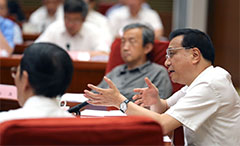Ex-advisor: Economy to enter a mid-rate growth track
2017-08-11
China Daily
The Chinese economy may be hitting the bottom rung of its growth cycle or will bottom out in one or two years, according to a leading academic and former top government advisor.
Then it will enter a mid-rate growth track, said Liu Shijin, former deputy head of the State Council’s Development Research Center.
“The Chinese economy is near its bottom and we should not be pessimistic about its growth prospects,” he said.
Liu made the comments in an introduction to a book on China’s economy, written by a research team of the Development Research Center.
Liu said exports and infrastructure investment have hit low levels while the growth in real estate investment will not continue despite its recent rebound. On the supply side, factory-gate prices are rising into positive territory and corporate profits are recovering.
“All of these are signs that the economy is very near the bottom area or is bottoming out,” he said.
In the coming years, China will enter a relatively stable, mid-rate growth track, although there may occur some minor fluctuations, Liu added.
China’s GDP growth beat market expectations to reach 6.9 percent in the first half of this year, but analysts generally predict it will ease moderately in the second half.
To stabilize growth, Liu suggested that China should accelerate the development of the services sector and promote economic restructuring and innovation to provide growth engines for its new stage of growth in the coming years.
China’s services sector has contributed to 51.4 percent of GDP, but Liu said that based on the experiences of developed economies, the ratio could further rise by 20 percent in the coming decades.
“China should further open up its economy and promote growth of the services sector,” Liu said.
The nation should also push supply-side structural reform, which will squeeze out low-efficiency market players and see competitive and innovative companies survive and stand out.
Liu warned that property prices of first-tier major cities have surged to “unexplainable levels”, pushing up development costs and undermining competitiveness of those cities. He suggested that land supply should be increased and the public rental housing program, in which people who cannot afford commercial housing can sign long-term contracts to rent government-subsidized apartments, should be promoted.
Liu urged that a tax on the holding of properties should be launched as soon as possible, to reduce real estate market speculation and increase tax revenues of local governments.


